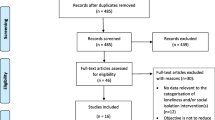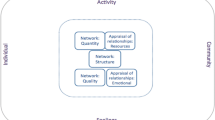Abstract
Background: When identifying ways to reduce stigmatization because of mental illness it is crucial to understand contributing factors. Social distance—the willingness to engage in relationships of varying intimacy with a person—is an indicator of public attitudes toward persons with mental illness. Methods: Multiple linear regression analysis of the results of a vignette-based opinion survey conducted on a representative population sample in Switzerland (n = 594). Results: The level of social distance increases if situations imply ‘social closeness.’ The vignette describing a person with schizophrenia, attitudes to general aspects of mental health (lay helping, community psychiatry), emotions toward those affected, and the attitude toward consequences of mental illness (medical treatment, medication side effects, negative sanctions, e.g. withdrawal of the driver license) were found to predict social distance. Demographic factors such as age, gender, and the cultural background influence social distance. The explained variance (R2) is 44.8%. Conclusions: Social distance is a multifaceted concept influenced by, e.g., socio-economic and cultural factors, but also by the respondent's general attitude toward (mental) health issues. These results suggest that more knowledge about mental illnesses, especially schizophrenia, may increase social distance. The findings presented here may help to focus anti-stigma campaigns not only on transmission of knowledge, but on integrating different approaches.
Similar content being viewed by others
References
Angermeyer, M.C., Link, B.G. & Majcher-Angermeyer, A. (1987). Stigma perceived by patients attending modern treatment settings. Journal of Nervous and Mental Disease, 175, 4-11.
Angermeyer, M.C. & Matschinger, H. (1997). Social distance toward the mentally ill: results of representative surveys in the Federal republic of Germany. Psychological Medicine, 27, 131-141.
Angermeyer, M.C., Matschinger, H. & Holzinger, A. (1998). Gender and attitudes toward people with schizophrenia. Results of a representative survey in the Federal Republic of Germany. International Journal of Social Psychiatry, 44, 107-116.
Bowman, J.T. (1987). Attitudes toward disabled persons: social distance and work competence. Journal of Rehabilitation, 53, 41-44.
Frey, J.H. & Mertens Oishi, S. How to Conduct Interviews by Telephone and in Person. Thousand Oaks, London, New Delhi: Sage, 1995.
Gellis, Z.D., Hu, N.S., Lee, S., Kim, J. (2003). Mental health attitudes among Caucasian-American and Korean counseling students. Community Mental Health Journal, 39, 213-224.
Jorm, A.F., Korten, A.E., Jacomb, P.A., Christensen, H., Rodgers, B., Pollitt, P. (1997). 'Mental health literacy': a survey of the public's ability to recognise mental disorders and their beliefs about the effectiveness of treatment. Medical Journal of Australia, 166, 182-186.
Kish, L. (1949). A procedure for objective respondent selection within households. Journal of the American Statistical Association, 44, 380-387.
Lauber, C., Nordt, C., Falcato, L. & Rössler, W. (2001). Lay recommendations how to treat mental disorders. Social Psychiatry and Psychiatric Epidemiology, 36, 553-556.
Lauber, C., Nordt, C., Falcato, L. & Rössler, W. (2002a). Public acceptance of compulsory admission of mentally ill people. Acta Psychiatrica Scandinavica, 105, 385-389.
Lauber, C., Nordt, C., Falcato, L. & Rössler, W. (2002b). Determinants of attitude to volunteering in psychiatry: results of a public opinion survey in Switzerland. International Journal of Social Psychiatry, 48, 209-210.
Lauber, C., Nordt, C., Sartorius, N., Falcato, L. & Rössler, W. (2000). Public acceptance of restrictions on mentally ill people. Acta Psychiatrica Scandinavica, 102 (suppl. 407), 26-32.
Lavrakas, P.J. (1993). Telephone Survey Methods: Sampling, Selection, and Supervision. Newbury Park, Ca, London, New Delhi: Sage.
Link, B.G., Cullen, F.T., Frank, J. & Wozniak, J.F. (1987). The social rejection of former mental patients: understanding why labels matter. American Journal of Sociology 92, 1461-1500.
Link, B.G., Phelan, J.C., Bresnahan, M., Stueve, A. & Pescosolido, B.A. (1999). Public conceptions of mental illness: labels, causes, dangerousness, and social distance. American Journal of Public Health, 89, 1328-1333.
Link, B.G., Struening, E.L., Neese-Todd, S., Asmussen, S. & Phelan, J.C. (2001) Stigma as a barrier to recovery: The consequences of stigma for the self-esteem of people with mental illnesses. Psychiatric Services, 52, 1621-1626.
Penn, D.L. & Corrigan, P.W. (2002). The effects of stereotype suppression on psychiatric stigma. Schizophrenia Research, 55, 269-276.
Penn, D.L., Kohlmaier, J.R. & Corrigan, P.W. (2000). Interpersonal factors contributing to the stigma of schizophrenia: social skills, perceived attractiveness, and symptoms. Schizophrenia Research, 45, 37-45.
Author information
Authors and Affiliations
Rights and permissions
About this article
Cite this article
Lauber, C., Nordt, C., Falcato, L. et al. Factors Influencing Social Distance Toward People with Mental Illness. Community Ment Health J 40, 265–274 (2004). https://doi.org/10.1023/B:COMH.0000026999.87728.2d
Issue Date:
DOI: https://doi.org/10.1023/B:COMH.0000026999.87728.2d




